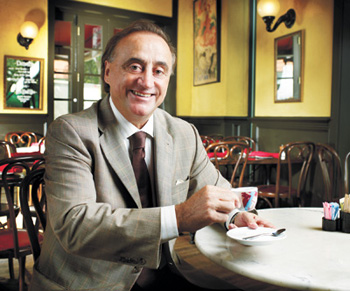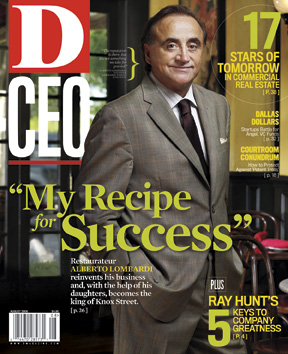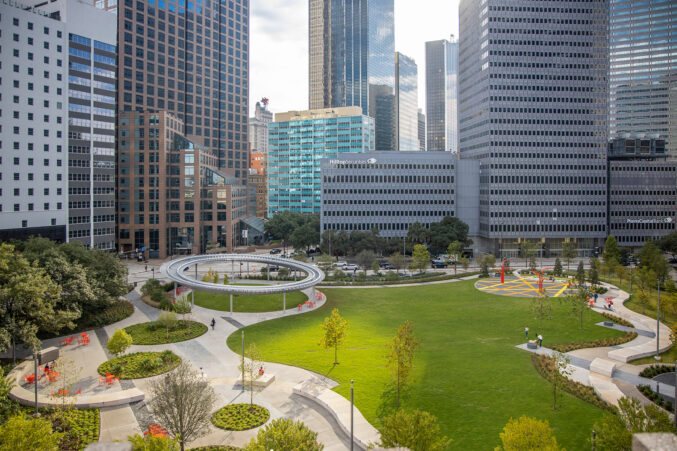Smaller And More Comfortable
Lombardi wasted no time adapting. He opened Penne Pomodoro in Snider Plaza in 2002, managed and co-owned by daughters Anna and Laura. Its smaller, cozier approach to authentic Italian cuisine was a hit—turns out family-friendly didn’t have to sacrifice flavor.
A second location at Preston and Forest followed the next year, along with the similarly cozy-yet-upscale Taverna pizzeria on Armstrong Avenue. The following years saw Lombardi continue creating a neighborhood’s worth of foreign variants: Spanish tapas at Sangria, French-gone-Belgian fare at Toulouse, late-night Cuban at La Cubanita. They all were smaller and more comfortable—each took between $800,000 and $900,000 to open—and all were within a walkable Highland Park radius.
Though Lombardi still runs and maintains restaurants in Austin and Fort Worth, his quartet of locations near Knox and McKinney has fostered the most excitement, surprising many by not cannibalizing each other’s sales. Could be thanks to the menus—as if the range of Lombardi concepts isn’t wide enough, each restaurant is its own little neighborhood, enough so that asking a waiter for a recommendation usually leads to a list roughly the length of the menu. The reason? While nothing on each menu stands out as a specialty or a must-have, perusing them is like poring through the Lombardi family’s countertop 3×5 cards: a delicately balanced vinaigrette salad here; a rich, creamy ham and cheese sandwich there; a chicken and mushroom pasta over there. No life-changers, but the lack of over-the-top concoctions is made up for by each restaurant’s balance of authenticity and value, diversity and accessibility.
This is why Lombardi’s four-times-a-week estimate for that patron at La Cubanita holds water. By placing these restaurants so close to each other (in a busy location with plenty of neighboring retail and foot traffic), Lombardi is attracting plenty of diners old and new—people in search of solid, reasonably priced cuisine inspired by his broad, European strokes. If anything, he’s not selling food; he’s selling the notion that Alberto Lombardi is the go-to guy for a consistent, varied dining experience right down the block.
And, in creating a neighborhood feel, Lombardi is returning to his maître d’ roots in being as complete a presence in the dining halls and kitchens as possible. He agonizes over each of his menus; at La Cubanita, for example, he stresses that he had to find just the right balance of Cuban flavor without being 100 percent authentic. “In Miami, [Cuban food] is very heavy—there’s garlic everywhere,” he says. “If you do that over here, it would not sell. You have to come up with a new, modern version of Cuban food.”
Owners aren’t expected to have much control over a menu: hire a great chef, pick the right management, and let them cook, the formula goes. Lombardi says his final say on restaurant decisions is for the sake of “marketing and meaning,” making sure the Dallas audience—the one he’s served for 31 years, the one he took so long to come back to—is given the flavors he believes they love. To make sure he’s got it right, Lombardi has made a new commitment to visit his restaurants frequently each week to meet and greet customers.
But for such a picky, personable guy, he won’t recommend a single dish. “Try any of it,” he says, his sly, signature smile showing up again. Turns out his recommendation one morning at La Cubanita isn’t necessary, as the whim choice of Picadillo Cubano is a shocker—poached eggs dribble into a robust beef hash, given particular life by a spicy, jalapeno hollandaise. And that description doesn’t take the plaintains into question—cooked to perfection, full of a mild sweetness I’d never tasted in a plantain.
Before stuffing my face, Lombardi’s clichés—“make the customer feel like a million dollars,” “my work is about the passion”—are frankly tough to swallow. Afterward, not so much. And, I can’t even polish my plate without Lombardi talking up his next ventures. Cibus, an Italian concept inside NorthPark Center, should see its official debut in September, he says. And the doors to Pesca Bar, a new West Village seafood restaurant complete with a raw bar, might already be unlocked by now. The man is obviously invigorated, refocusing his work to serve a neighborhood niche, and happy to set a firm anchor within Dallas. But even better than that is to see that, for all his talk about history, Lombardi knows his 31 years in business don’t guarantee success.
“The name is very important—what it does, it brings you the customers right away,” he says. “But let’s not mistake—that won’t make you successful if you don’t give them what they want as far as service, quality, value, personalized service, all of that. You still will close your restaurant if you don’t do it right. We’ve been in business a long time. The reputation is there. But it’s not something we take for granted.”

CEO SNAPSHOT
ALBERTO LOMBARDI
Hometown: Forli, Italy
Personal: Married to Vivian Escobar Lombardi for eight years; couple has a 4-year-old son, Luca. Lombardi also has three daughters from his first marriage: Sara Lombardi and Anna Lombardi Daigle work with their father in Dallas; Laura McDonnell is a stay-at-home mother of three.
Education: Attended The Hotel Palace hospitality school in Rimini, Italy
Business: Lombardi is the owner and founder of Lombardi Family Concepts, which operates Penne Pomodoro, Taverna, Café Toulouse, Sangria Tapas y Bar, La Cubanita, Pesca Bar, and soon, Cibus.
Employees: Approximately 400
Other involvements: Big Brothers, Big Sisters; plays a lot of tennis. Last year, Lombardi and a group of friends hiked Machu Picchu in Peru to celebrate his 58th birthday.






